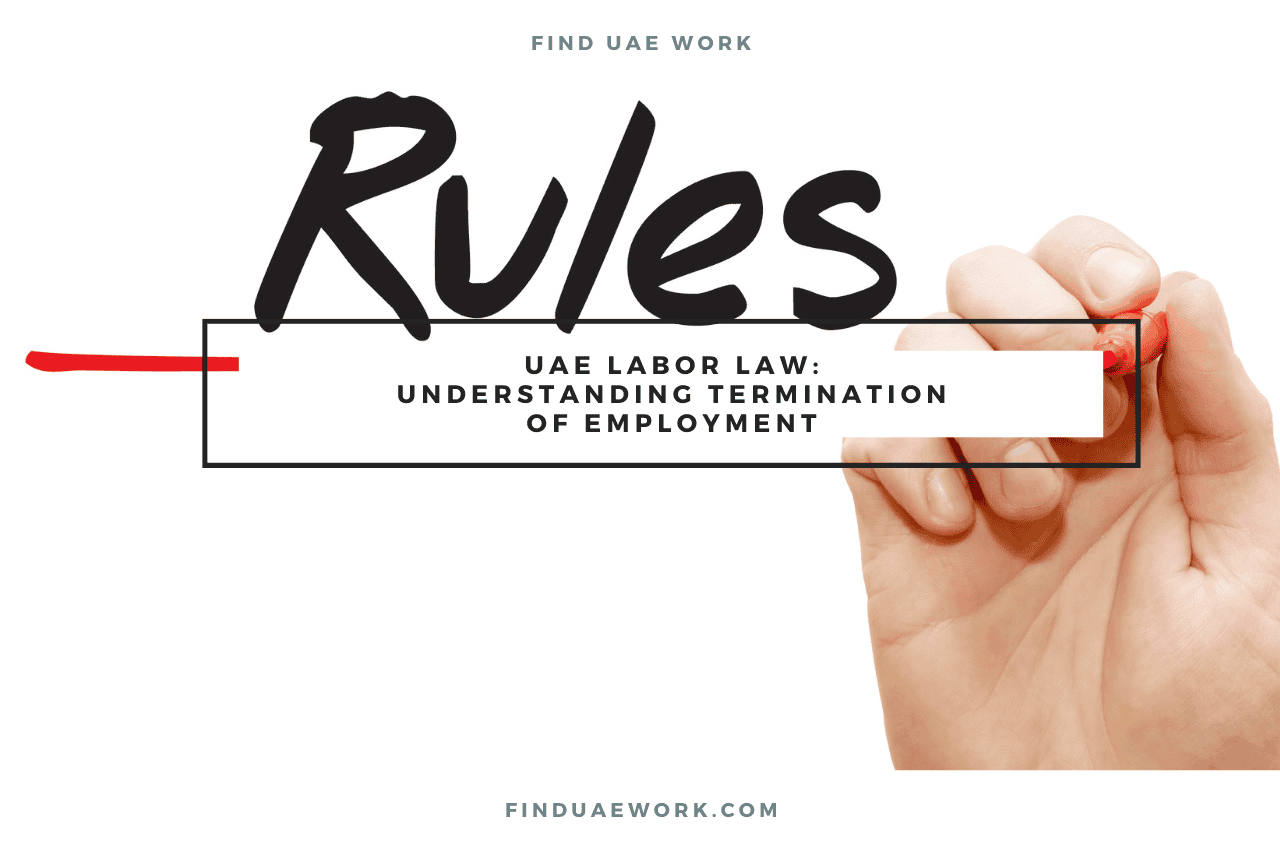The UAE is a vibrant and competitive job market that attracts professionals worldwide. To work smoothly within the country, understanding the labor laws, especially those related to employment termination, is essential. This guide breaks down the UAE Labor Law on termination, valid and invalid reasons for termination, procedures, and employee rights.
Overview of UAE Labor Law
The UAE has a clear legal framework that governs the relationship between employers and employees. Key legislations include:
- Federal Decree-Law No. 33 of 2021: Covers crucial aspects like employment contracts, wages, working hours, leaves, termination procedures, and dispute resolution.
- Federal Decree-Law No. 47 of 2021: Focuses on general labor rules, workplace safety, inspections, and penalties for non-compliance.
Types of Termination
Employment termination in the UAE falls under these main categories:
- Termination with Notice: Either party (employer or employee) can end the contract by giving the required notice period as stated in the employment agreement.
- Termination Without Notice: Employers can dismiss an employee immediately for serious misconduct, such as theft, fraud, or violating workplace policies.
Valid Reasons for Termination
Certain reasons are legally acceptable for terminating employment in the UAE:
- Poor Performance: If an employee consistently underperforms despite warnings and support to improve.
- Misconduct: Gross violations like theft, fraud, or workplace violence.
- Redundancy: Positions may be terminated due to restructuring, downsizing, or economic challenges.
- Contract Expiry: Fixed-term contracts naturally end if not renewed.
Invalid Reasons for Termination
Terminating an employee for the following reasons is considered unlawful:
- Discrimination: Dismissals based on race, religion, gender, or nationality are prohibited.
- Retaliation: Firing someone for filing complaints or legal proceedings against the employer is illegal.
- Illness: Termination due to temporary illness is not allowed, provided the illness does not exceed the legal sick leave duration.
Termination Process
Employers and employees must follow specific steps when ending an employment contract:
- Written Notice: A clear written notice must state the reasons for termination and the effective date.
- Notice Period: Both parties must respect the notice period, which is typically 30 days unless stated otherwise.
- Final Settlement: The employer must settle all dues, including unpaid salary, unused leave, end-of-service benefits, and any other agreed payments.
Notice Period
- Standard Period: The notice period is usually 30 days for most employees.
- Special Cases: Senior-level or specialized roles may have notice periods of up to 90 days.
- Waiving the Notice: Both parties can agree to waive the notice period. In such cases, the employer may pay compensation in lieu of notice.
Employee Rights After Termination
Employees are entitled to specific benefits after their employment ends:
- End-of-Service Gratuity: Employees with at least one year of service receive gratuity based on their length of employment.
- Unused Annual Leave: Employers must compensate employees for unused leave days.
- Unpaid Salary: Any outstanding salary, including overtime pay, must be cleared.
- Early Termination Compensation: If a fixed-term contract is terminated without valid grounds, the employee can seek compensation.
- Health Insurance: In some cases, health insurance may continue temporarily after termination, depending on company policy.
Frequently Asked Questions
1. Can I be terminated without notice in the UAE?
Yes, but only for serious misconduct, such as theft, fraud, or severe rule violations.
2. What happens if I’m terminated without a valid reason?
You can file a complaint with the Ministry of Human Resources and Emiratisation (MOHRE) to seek compensation or resolution.
3. How is the end-of-service gratuity calculated?
It depends on your years of service. Gratuity is calculated as a percentage of your last drawn salary.
4. Is termination due to redundancy legal?
Yes, termination due to redundancy is valid if the employer can justify economic or operational reasons.
5. Can my employer terminate me for taking sick leave?
No, employers cannot terminate employees for being on sick leave unless the absence exceeds the legally allowed duration.
Conclusion
Understanding UAE Labor Law regarding termination is crucial for ensuring fair treatment in the workplace. By knowing your rights and responsibilities, you can navigate the termination process confidently and ensure you receive all due entitlements.
- UAE WORK-Urgent Hiring: Pakistani Return Mixer Heavy Drivers for Saudi Arabia - February 28, 2025
- UAE Work -Office Assistant Job in Dubai – Apply Now! - February 27, 2025
- UAE Work Haram Sharif Cleaner Jobs in Makkah – 15 Vacancies Available - February 26, 2025
Important Notice: Genuine employers will never ask for payment during the job application, interview, or hiring process. If someone requests payment for job applications, tests, or interviews, it’s likely a scam. Protect yourself by staying cautious and reporting any suspicious activity immediately. Stay vigilant and safeguard your career!

